I think I’ve mentioned my lack of enthusiasm for most non-fiction books before. However, I discovered Sharon Bennett Connolly’s amazing blog, History, The Interesting Bits, a few years ago, and her subsequent book, Heroines of the Medieval World, so hooked me into her writing that I immediately ordered the book and was sucked into the medieval universe of little-known historical women who accomplished some pretty amazing things.
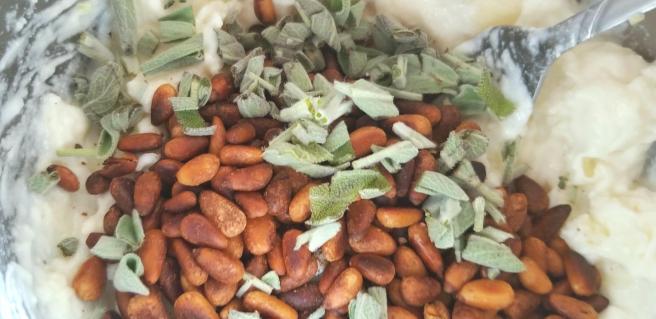
Bennett Connolly has that knack of turning everyday, ordinary, day-to-day lives into something greater and larger than all of us. What I particularly love about this book is that it tells stories of women who actually existed, had kids, raised families, married (often multiple times), maintained homes, and who made a name for themselves within a world that essentially viewed them as property. There are, of course, the very well known medieval heroines such as Joan of Arc, Heloise d’Argenteuil (she of Abelard and Heloise romantic fame), Hildegarde of Bingen, and a dear and personal friend of mine from Catholic school, St. Julian of Norwich who wrote Revelations of Divine Love and was the first Catholic mystic I ever read……..though not the last.

There weren’t any specific food mentions in this book, but being that it’s about women and their traditional role in a culture and society, of course cooking and food preparation was likely the most essential task in their lives, after giving birth, of course. And it gave me some leeway in choosing what I wanted to make. Bennett Connolly’s heroines lived in medieval England, France, Italy, Spain, Wales and Germany, so you have a marvelous variety of food right there to choose from AND the marvelous variety of female heroines. And my favorite heroine in this book has to be the little-known Venetian writer Christine de Pisan. One of the very first women who was actually paid for her writing – imagine that! – she was born in Venice, Italy in 1364.

Her father was a court astrologer and physician for the Venetian court until he accepted a position with the French court and the family moved there in 1368. So though native to Italy, she was very French in her outlook, political views, and most especially in her writing. Her husband died in 1389, leaving her with three children. In order to support them, she turned to writing and produced her most well-known work, The Book of the City of Ladies, an image of which is shown below.

As Bennett Connolly describes:
The book tells of the lives of past and present heroines, including pagan, Hebrew, and Christian ladies who were renowned for being examples of exemplary womankind, famed for their chastity, loyalty and devotion. It included the lives of female saints who remained steadfast in their devotion to God in the face of martyrdom. City of Ladies was Christine’s response to the misogynistic portrait of womankind that was present in many works of the era, in which women were blamed for the misery in which men found themselves.
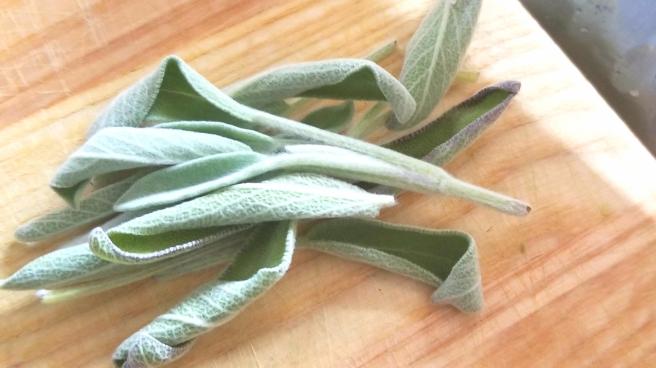
That doesn’t sound at ALL familiar now, does it?
Anyway, I found this marvelous website dedicated to medieval recipes from various countries in Europe – www.medievalcuisine.com – and found one from Italy that sounded delicious. So in honor of Christine de Pisan and all the women of medieval times, I present cheese and pinenut fritters – fritelle da Imperadore Magnifici – which would have been commonly eaten as a sweet dish in the Roman and Venetian regions in the time of de Pisan’s life. I tweaked to make it more savory and added my own flavoring twists as I always do.
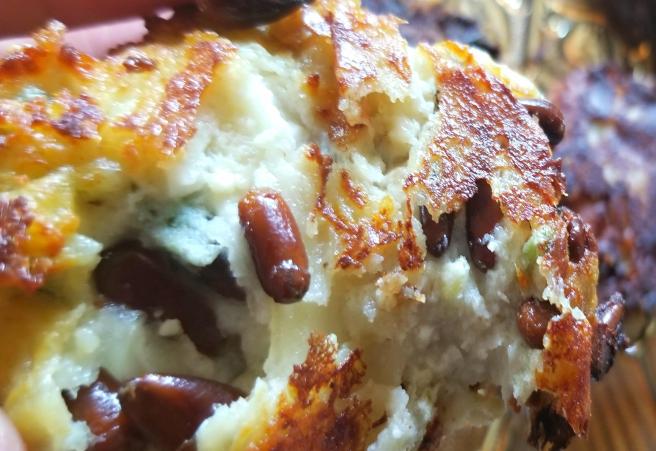
INGREDIENTS
1/2 cup Ricotta cheese
1/2 cup shaved Parmesan cheese
4 sage leaves, finely minced
2 garlic cloves, peeled
2 egg whites
2 generous handfuls of pine nuts
1/2 teaspoon salt
4 tablespoons flour
Olive oil for frying
METHOD
Toast the pine nuts in a dry pan until they brown and give off that nutty scent. Set aside.

Mix the cheeses together, and grate in the garlic.

Gently whisk the egg whites before adding to the cheese mixture.

Add in the toasted pine nuts and the finely minced sage, and then add in the flour and the salt, stirring everything together.
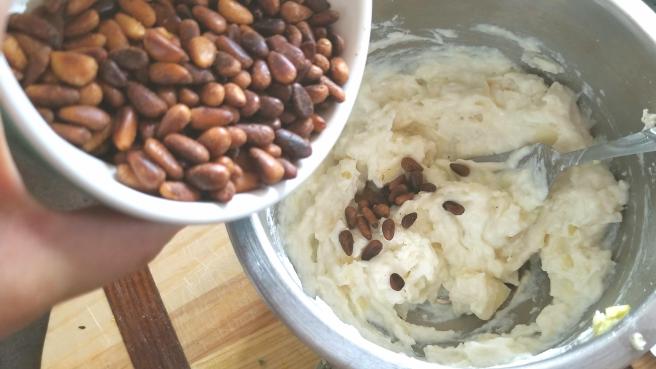
Heat the olive oil until shimmering, and one spoonful at a time, scoop the cheesy batter into the oil. Fry until golden brown, about 2-3 minutes per side, and drain on paper towels. Eat while still hot.

These are quite delicious, not overly salty and very rich, so you’ll probably only want one or two. And though the flavorings are my own, the basic method is essentially medieval, and are authentically Italian. Just like Christine de Pisan!
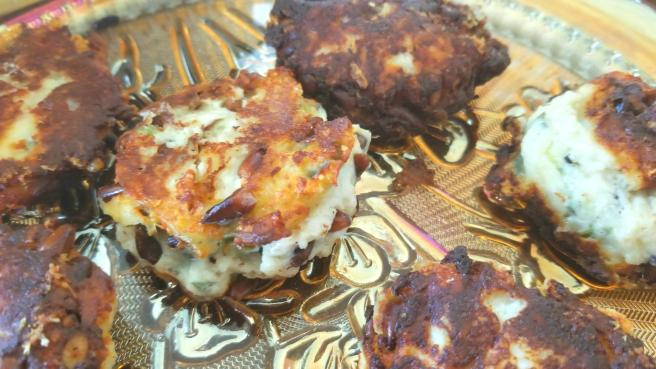

Love it as usual.
Have you ever read Phillipa Gregory? Historical Fiction at its best. My favorite is Earthly Joys.
https://www.philippagregory.com/
LikeLiked by 1 person
Thank you! I have heard of her though I
LikeLike
I hit send before I finished my comment. I’ve heard of her though never read any of her works. Thanks for the link! Heading over to check it out now.
LikeLiked by 1 person
I recommend Sharon Kay Penman for historical fiction set in the medieval period…actual history with living color!
LikeLiked by 1 person
Yes, she’s a wonderful writer! I’ve read a few things by her and she truly brings the medieval ages to life. Her trilogy about Henry Plantagenet and Eleanor of Aquitaine was my favorite.
LikeLiked by 1 person
Same!
LikeLiked by 1 person
“cooking and food preparation was likely the most essential task in their lives, after giving birth, of course.” 😂😂😂😂 Of course. 😋
I sometimes have a tough time with non – fiction, the context really has to speak to me, and this book sounds like a truly wonderful idea!! I’ll have to check it out!
And that fritter sounds TO DIE FOR!!! 😍😍
LikeLiked by 1 person
Awww, thank you! It was really an excellent read and I am no fan of non fiction. But the lives of these women really were amazing. And the fritters…….I presume I need to add these to your care package? 🤣
LikeLiked by 1 person
Damn straight you do!! The postal service is going to wonder what this refrigerated box the size of a house is, soon! 😂😂
LikeLiked by 1 person
What a fun book, recipe and website you’ve shared with us! I knew those were pine nuts and just couldn’t imagine what they were going to turn out to be. Funny as I’ve gotten older I find myself more interested in nonfiction, and I love anything medieval.I could go right down a rabbithole!
LikeLiked by 2 people
Thank you, Mollie! I had a blast looking at those recipes and imagining how they were made within the medieval timeframe and also how they might translate to modern times. The fritters were delicious, very rich and tasty and the toasted pine nuts just added a depth of flavor that was wonderful. I really had fun with this one, and love the book, though it’s not one I’d normally choose. You would probably enjoy it.
LikeLiked by 1 person
🙂 I am sure I would!!
LikeLiked by 1 person
Vanessa, you’ve done a wonderful job of making me interested in a book that I would likely never pick up on my own. And I love how you selected a medieval recipe with which to pay homage and then made it savory according to your inspiration. That’s so creative. One day you should do your own book!
But on another note, why do Christine de Pisan’s writings in response to the attitudes men had toward women resonate 600+ years later?!
LikeLiked by 1 person
Thanks, Leslie! It’s not a book I’d normally read either, not much caring for non fiction, but the stories of these women are truly amazing and Sharon Bennett Connolly writes about them in a really humanizing way. I appreciate your feedback on the recipe, too…..quite yum and very rich. As far as Christine de Pisan’s writing goes, it resonates for me because as much progress as we’ve made as women, there is still so much backlash and pressure. I actually feel that about most groups that are not white males, though I am not trying to generalize either. But women, minorities, anyone of a different ethnicity or background these days, seems to have such a difficult time. Not to get political, but I definitely think the current administration has fostered this ugliness and it has spilled over onto the rest of the country, and even the world in some cases. Reading your recent series about Black Men Reading has brought it home to me that if you’re not a white male in this country, you still have so much of a struggle to deal with. Anyway, I will step down from my soapbox now. 🙂
LikeLike
I agree, Vanessa! And there is a stronger and I feel more hateful than ever attitude from women, towards women! And I know this is a gross generalization but so much of it does seem to come from a certain type of so-called “family-oriented” women that have embraced the current administration. There’s a hateful smugness that that seems to color their attitudes against any that don’t share what they see as their same values, religion, color and/or financial circumstances.
LikeLiked by 1 person
Agree 100%. It’s very sad that, after everything women have gone through and still are going through, that oftentimes, they are turned upon and villified by those of their own gender. Very, very depressing and sad…….and that’s why it’s so important to stay positive, promote women’s rights and not allow ourselves to sink to that level. As Michelle Obama said, when they go low, we go high.
LikeLiked by 1 person
Absolutely! And I think education and reading, btw, are so important in widening horizons!
LikeLiked by 1 person
thank you for not only the amazing looking recipe for for the book review………..I love nonfiction and especially interesting historical books. Thank you!!!!!!
LikeLiked by 1 person
Well I definitely think you would love this one. I am not a nonfiction person and I loved this book. The stories of these women are just amazing.
LikeLiked by 1 person
I am looking forward to a new read, thanks to you!
LikeLiked by 1 person
Really enjoyed your commentary here. I liked the idea of a widow turning to writing to support not only herself but her children. Seems today there are people who frown upon someone getting paid for writing. It’s work so why not? Also that recipe looks delicious 😋
LikeLiked by 2 people
I just loved the concept of a woman actually getting paid for her writing in the medieval period. 🤣 Thanks for the compliment too. Great fritters, though quite rich. You’ll want to share them.
LikeLiked by 1 person
Yes that’s amazing! Stickin’ it to the man 😂. You’re welcome! Are you sure? I might want them all to myself 😂
LikeLiked by 1 person
Ok go for it! I had to force myself to stop after two. 😋
LikeLiked by 1 person
Lolol I’m kidding. Of course I’d have to share. That’s excellent willpower
LikeLiked by 1 person
Definitely something I am not known for. Lol!
LikeLiked by 1 person
Lol I commend you for that 🙂
LikeLiked by 1 person
…not only prepping ingredients for nutrition… often women were (and remain in a few places) the primary keepers of medicinal knowledge, even achieving official status.
LikeLiked by 2 people
Yes, you are absolutely right, it’s just unfortunate that there were not more of them in that time period. That’s why I love this book, Because it keeps the memory alive not only of the women who were able to do something noteworthy but also the memory of those who have faded into history.
LikeLiked by 1 person
…yup. I tried to google the name of the woman-doctor in Legnano (lombardia) at the time of the noted battle (12th century) but couldn’t find her, at least not easily. Pleasure to see others helping bring to light similar. (ie We all know Watson and Crick, but few still have heard of Franklin….)
LikeLiked by 1 person